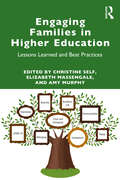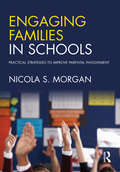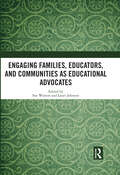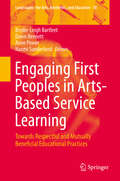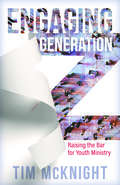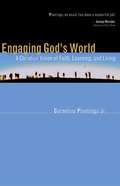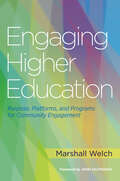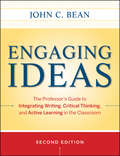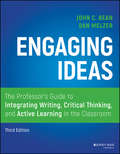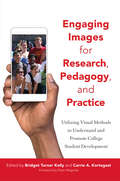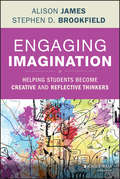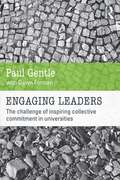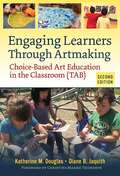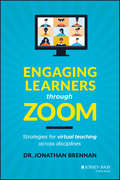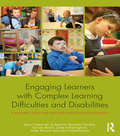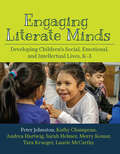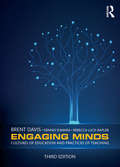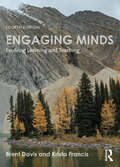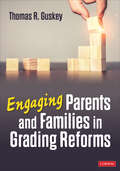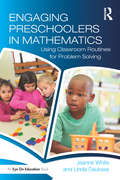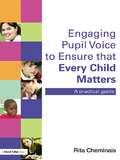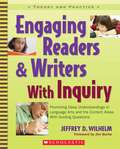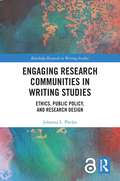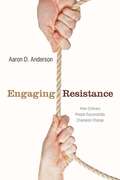- Table View
- List View
Engaging Families in Higher Education: Lessons Learned and Best Practices
by Amy Murphy Christine Self Elizabeth MassengaleIn today’s colleges and universities, parents and families are increasingly important as partners to support students in enrolling and navigating the college experience. Tailored to higher education professionals who work with the families of college students, this book provides a solid foundation for establishing or enhancing parent and family initiatives across the institution and how to partner with families to foster student success. The chapter authors, seasoned professionals working in higher education, share best practices and relevant research related to partnering with families and addressing challenges that come with engaging families. Chapters also explore ways to make parent and family programming accessible for first-generation families and families from underrepresented groups who may often feel left out of traditional activities, programs, and services. Chapters feature "Voices from the Field" sharing best practices as well as "Tough Talks" breaking down some of the more difficult interactions between families and students and staff. This book is a valuable resource to higher education and student affairs professionals seeking to strengthen their work with families in order to better support student success in college.
Engaging Families in Schools: Practical strategies to improve parental involvement
by Nicola S. MorganEngaging Families in Schools is a practical resource that provides strategies and ideas that will contribute to the effective engagement of families and the involvement of parents in their child’s education. Parental engagement with school staff has a significant and very positive impact on children’s learning, and strategies presented have been extensively trialled in a variety of different settings. Nicola S. Morgan shows school staff how to understand the importance of family engagement and evidence the outcomes. This book has been split into ten easily accessible units: Understanding the importance of parent engagement Using whole-school strategies to engage parents The role of the family engagement officer Engaging all parents Engaging Dads Engaging multicultural parents Difficult to engage parents Working with parents to improve student attainment Working with parents to improve behaviour and attendance Working with parents of children with additional needs This is a must-read guide for teaching and non teaching staff who wishes to bridge the gap between their student’s school and family life and understand the effects of positive family engagement.
Engaging Families, Educators, and Communities as Educational Advocates
by Sue Winton Lauri JohnsonThis edited collection broadens understanding of family–school–community partnerships by focusing on how community groups, educators, and university professors engage with public education to achieve their own goals rather than goals defined by schools, school systems, and governments. Authors critically examine various school–community partnerships that collectively aim to improve decision-making, democratize policy processes, resist policies that support the marketization of public education, and advocate for racial equality. The book’s chapters focus on advocacy efforts within and across three national contexts—England, Canada, and the United States. Together they expand current scholarship by demonstrating how different constituencies develop alliances, experience tensions, and navigate the politics inherent in change efforts. By examining the intersections of parent and community organizing, teacher unions, and school–community partnerships across national contexts, the chapters uncover fruitful new terrain for understanding the theory and practice of educational activism. This volume was originally published as a special issue of Leadership and Policy in Schools.
Engaging First Peoples in Arts-Based Service Learning
by Brydie-Leigh Bartleet Dawn Bennett Anne Power Naomi SunderlandThis volume offers educators, higher education institutions, communities and organizations critical understandings and resources that can underpin respectful, reciprocal and transformative educative relationships with First Peoples internationally. With a focus on service learning, each chapter provides concrete examples of how arts-based, community-led projects can enhance and support the quality and sustainability of First Peoples' cultural content in higher education. In partnership with communities across Australia, Aotearoa New Zealand, Canada and the United States, contributors reflect on diverse projects and activities, offer rich and engaging first-hand accounts of student, community and staff experiences, share recommendations for arts-based service learning projects and outline future directions in the field.
Engaging Generation Z: Raising the Bar for Youth Ministry
by Tim McKnightA holistic approach to reaching Generation Z in your local churchTo disciple the youth in our student ministries today, we have to understand the unique characteristics of Generation Z, and apply lessons learned from recent decades of youth ministry. In this thoroughly revised second edition of Raising the Bar: Student Ministry for a New Generation, pastor and professor Timothy McKnight brings a wealth of new insights, resources, and guidance for reaching today's adolescents.Following an overview of the beliefs, attitudes, and practices of Generation Z, McKnight provides youth pastors and volunteers with a complete plan for discipling adolescents through the local church. This includes practical advice on topics such as:• Engaging parents in youth ministry• Holistically guiding students in their beliefs, behavior, and affections• Equipping adult leaders who can serve as role models• Working with pastors, staff, and church leaders• Helping parents develop rites of passage for their children as they move into adulthood• Raising expectations for adolescents to encourage them to grow toward maturityBased on years of personal experience and practice, Engaging Generation Z provides everything youth ministers need to equip, grow, and encourage today's generation of young people to follow Christ, and to take their student ministry to the next level.
Engaging God's World: A Christian Vision of Faith, Learning, and Living
by Cornelius Plantinga Jr.The Bible admonishes Christians to love God with the mind as well as with the heart. Engaging God's World clearly links this scriptural mandate with the pursuit of academic life, extolling the crucial role of Christian higher education in the intellectual and spiritual formation of believers. Chiefly intended to serve as a primer for students beginning college careers but valuable to thoughtful Christians at every stage of life, this volume spells out the central themes of the Christian faith from a Reformed perspective. More important, however, the book shows how Christian higher education fits inside a view of the world and of human life that is formed by these ideas. "Learning," Cornelius Plantinga writes, "is a spiritual calling; properly done, it attaches us to God." Approaching the topic of education from a variety of angles, Plantinga shows that Christ-centered learning teaches people to correctly see the world as God's creation, to see providence in history, to handle secular knowledge critically, to develop good judgment and, ultimately, to use faith-filled learning in the service of God's kingdom.
Engaging Higher Education: Purpose, Platforms, and Programs for Community Engagement
by Marshall WelchCo-published with For directors of campus centers that have received the Carnegie Classification for Community Engagement, this book offers research and models to further advance their work. For directors starting out, or preparing for application for the Carnegie Classification, it provides guidance on setting up and structuring centers as well as practical insights into the process of application and the criteria they will need to meet.Building on the findings of the research undertaken by the author and John Saltmarsh on the infrastructure of campus centers for engagement that have received the Carnegie Classification for Community, this book responds to the expressed needs of the participating center directors for models and practices they could share and use with faculty, and mid-level and upper-level administrators to more fully embed engagement into institutional culture and practice.This book is organized around the purpose (the “why”), platforms (the “how”), and programs (the “what”) that drive and frame community engagement in higher education, offering practitioners valuable information on trends of current practice based on Carnegie Classification criteria. It will also serve the needs of graduate students aspiring to become the future professoriate as engaged scholars, or considering preparation for new administrative positions being created at centers.
Engaging Ideas
by John C. Bean Maryellen WeimerLearn to design interest-provoking writing and critical thinking activities and incorporate them into your courses in a way that encourages inquiry, exploration, discussion, and debate, with Engaging Ideas, a practical nuts-and-bolts guide for teachers from any discipline. Integrating critical thinking with writing-across-the-curriculum approaches, the book shows how teachers from any discipline can incorporate these activities into their courses. This edition features new material dealing with genre and discourse community theory, quantitative/scientific literacy, blended and online learning, and other current issues.
Engaging Ideas: The Professor's Guide to Integrating Writing, Critical Thinking, and Active Learning in the Classroom
by John C. Bean Dan MelzerUse your course's big ideas to accelerate students’ growth as writers and critical thinkers The newly revised third edition of Engaging Ideas delivers a step-by-step guide for designing writing assignments and critical thinking activities that engage students with important subject-matter questions. This new edition of the celebrated book (now written by the co-author team of Bean and Melzer) uses leading and current research and theory to help you link active learning pedagogy to your courses' subject matter. You'll learn how to: Design formal and informal writing assignments that guide students toward thinking like experts in your discipline Use time-saving strategies for coaching the writing process and handling the paper load including alternatives to traditional grading such as portfolio assessment and contract grading Help students use self-assessment and peer response to improve their work Develop better ways than the traditional research paper to teach undergraduate reading and research Integrate social media, multimodal genres, and digital technology into the classroom to promote active learning This book demonstrates how writing can easily be integrated with other critical thinking activities such as inquiry discussions, simulation games, classroom debates, and interactive lectures. The reward of this book is watching students come to class better prepared, more vested in the questions your course investigates, more apt to study purposefully, and more likely to submit high-quality work. Perfect for higher education faculty and curriculum designers across all disciplines, Engaging Ideas will also earn a place in the libraries of graduate students in higher education.
Engaging Images for Research, Pedagogy, and Practice: Utilizing Visual Methods to Understand and Promote College Student Development
by Bridget Turner Kelly Carrie A. KortegastThis book introduces practitioners and researchers of student affairs to the use of images as a means to gaining new insights in researching and promoting student learning and development, and understanding the campus environment. Visual research methods can surface and represent ideas in compelling ways and augment the traditional written word and numerical data methodologies of social science research. The purpose of this book is to provide informative, rich examples of the use of visuals to understand and promote college student development research, pedagogy, and practice.With the increased accessibility of cameras, the ability to engage in image production has become widely available. Individual--including college students, faculty, and administrators--narrate the social world in new ways using visuals. While on the one hand students are using images to mobilize around social issues on campus, on the other, institutionally produced visual artifacts send messages about institutional culture and values. In promoting visual literacy, this book offers new opportunities for student development administrators and faculty to utilize the visual sensory modality and image-based artifacts to promote student success and belonging which are critical outcomes of higher education.The book is divided into three sections: research, pedagogy, and practice. The first makes the case for adding visual methods to the researcher’s toolbox, describing past uses and outlining a theoretical approach to visual methods and methodologies in higher education research. The pedagogical section demonstrates different and creative ways for educators to think about how subjects--such as social justice--might be taught and how educators can draw upon new, changing modalities in their existing pedagogies and frameworks; and it illustrates how visual-based pedagogies can prompt students to new understandings about the content of their course of study. The concluding section describes how student development professionals can also utilize visual methods to provide students with out-of-classroom learning opportunities and as a means to stimulate student reflection and identity development. It also explores how visual methods can serve a way for practitioners to reflect on their professional practice and use of theory in their work. Intended for higher education educators, researchers, and practitioners who teach, research, and promote college student development and learning, this book could also be used in student affairs and higher education courses and professional development workshops.
Engaging Imagination
by Alison James Stephen D. BrookfieldHow to nurture creativity in tomorrow's innovators--today's college students When asked what they want colleges to emphasize most, employers didn't put science, computing, math, or business management first. According to AAC&U's 2013 employer survey, 95% of employers give hiring preference to college graduates with skills that will enable them to contribute to innovation in the workplace. In Engaging Imagination: Helping Students Become Creative and Reflective Thinkers, two leading educators help college instructors across disciplines engage students in nurturing creativity and innovation for success beyond the classroom. Alison James, an expert in creative arts education, and Stephen D. Brookfield, bestselling author, outline how creative exploration can extend students' reflective capabilities in a purposeful way, help them understand their own potential and learning more clearly, and imbue students with the freedom to generate and explore new questions. This book:shows why building creative skills pays dividends in the classroom and in students' professional lives long after graduation;offers research-based, classroom-tested approaches to cultivating creativity and innovation in the college setting;provides practical tools for incorporating "play" into the college curriculum;draws on recent advances in the corporate sector where creative approaches have been adopted to reinvigorate thinking and problem-solving processes; andincludes examples from a variety of disciplines and settings.Engaging Imagination is for college and university faculty who need to prepare students for the real challenges of tomorrow's workplace.
Engaging Leaders: The challenge of inspiring collective commitment in universities
by Dawn Forman Paul GentleAddressing the question of how leadership can work most successfully in universities, Engaging Leaders strengthens the sense of shared professional knowledge and capability amongst leaders in higher education. Presenting a narrative of change which not only spells out why universities need to work differently, this book also takes the reader through clear practical steps which any practising leader can take in order to build a collaborative professional culture which supports and challenges all members of an academic community. Using a selection of case studies from UK and international universities, the book explores why working collectively remains a fundamental challenge for many higher education institutions and looks at the benefits of creating a collective commitment throughout universities. It covers: action learning and professional learning communities emotionally-intelligent organisational cultures feedback as an intrinsic tool building partnerships and collaborations Higher Education and public value cultures of innovation and sustainable practices. Engaging Leaders is for those who see themselves as leaders in higher education, whether or not this is recognised in their job title. It provides stimulating perspectives on what they might do to become more engaged and engaging, and includes examples of inspiring practice which is already making a difference in universities, colleges and new private providers. It will be of value to established managers as well as those new in post, and also for those participating in postgraduate programmes.
Engaging Learners Through Artmaking: Choice-based Art Education In The Classroom (tab)
by Christine Marmé Thompson Katherine M. Douglas Diane B. JaquithThe authors who introduced the concepts of Teaching for Artistic Behavior (TAB) and choice-based art education have completely revised and updated their original, groundbreaking bestseller that was designed to facilitate independent learning and support student choices in subject matter and media. More than ever before, teachers are held accountable for student growth and this new edition offers updated recommendations for assessments at multiple levels, the latest strategies and structures for effective instruction, and new resources and helpful tips that provide multiple perspectives and entry points for readers.
Engaging Learners through Zoom: Strategies for Virtual Teaching Across Disciplines
by Jonathan BrennanKeep your virtual students focused and meaningfully engaged with this invaluable teaching resource Engaging Learners through Zoom delivers numerous practical strategies and helpful advice on how to engage students virtually. Many of the tools are also applicable in face-to-face and hybrid environments. Backed by cognitive neuroscience research, this book is a collection of dozens of active, synchronous online learning structures that can be used in any discipline, perfect for K-12 through higher education. This book provides teachers, college educators, administrators, and trainers the antidote to Zoom fatigue! Transform Zoom (or any video-conferencing platform) into an ideal environment for students to focus more fully, learn more effectively and have more fun! Dr. Brennan, accomplished author, professor and distance education expert, improves learner performance and addresses equity in education with: Over 150 active learning strategy examples with step-by-step directions Ideas for including diverse content across 83 different disciplines Multiple examples for 26 of the most commonly taught courses Engaging Learners through Zoom belongs in the collection of every educator who wants to motivate and inspire their students to excel in a virtual learning environment.
Engaging Learners with Complex Learning Difficulties and Disabilities: A resource book for teachers and teaching assistants
by Barry Carpenter Jo Egerton Beverley Cockbill Tamara Bloom Jodie Fotheringham Hollie Rawson Jane ThistlethwaiteChildren and young people with Complex Learning Difficulties and Disabilities (CLDD) have co-existing and overlapping conditions which can manifest in complex learning patterns, extreme behaviours and a range of socio-medical needs which are new and unfamiliar to many educators. Their combination of issues and layered needs – mental health, relationship, behavioural, physical, medical, sensory, communication and cognitive – mean they often disengage from learning and challenge even our most experienced teachers. This book provides school practitioners and leaders with an approach and resources to engage this often disenfranchized group of children in learning. The Engagement for Learning Framework has been developed and trialled by over 100 educational settings (both special and mainstream) with learners from early years to post-16. It gives practitioners from a range of disciplines a shared means of assessing, recording and developing personalized learning pathways and demonstrating progression for these children. The focus on inquiry means that however complex a young person’s needs, educators will be able to apply the approach. This practical and engaging book provides literature, tools and case study examples outlining who children and young people with CLDD are, why their engagement for learning is important and how the Engagement for Learning Framework can be used effectively by teachers and other professionals to ensure the best possible outcomes for these children.
Engaging Literate Minds: Developing Children’s Social, Emotional, and Intellectual Lives, K–3
by Andrea Hartwig Peter Johnston Kathy Champeau Sarah HelmerIncreasingly, educators are recognizing that for children to thrive intellectually they need socially and emotionally healthy classrooms. Conveniently, this is exactly what parents have always wanted for their children's classrooms that offer and grow positive relationships and behavior, emotional self-regulation, and a sense of well-being. Using the guiding principles from Peter Johnston's best-selling professional resources, Choice Words and Opening Minds,Peter and six colleagues began a journey to create just such classrooms'senvironments in which children meaningfully engage with each other through reading, writing, making, and discussing books. Together, they bring you Engaging Literate Minds: Developing Children's Social, Emotional, and Intellectual Lives, K-3 where you'll discover how these teachers struggled and succeeded in building such classrooms. Inside you'll find the following: Practical ways to develop a caring learning community and children's socio-emotional competencePowerful teaching practices from real classroomsEngaging ways to encourage inquiry and student agencySuggestions on how to use formative assessment in everyday teaching practicesHelpful research behind the classroom practices and children's developmentWays to help students inspire and support each otherBuilding a just, caring, literate society has never been more important than it is today. By embracing the ideas and teaching strategies Engaging Literate Minds, you can help children to become socially, emotionally, and intellectually healthy. Not only do these classroom practices develop the skills to achieve district benchmarks and beyond, they help develop children's humanity.
Engaging Minds: Cultures of Education and Practices of Teaching
by Brent Davis Dennis Sumara Rebecca Luce-KaplerEngaging Minds: Cultures of Education and Practices of Teaching explores the diverse beliefs and practices that define the current landscape of formal education. The 3rd edition of this introduction to interdisciplinary studies of teaching and learning to teach is restructured around four prominent historical moments in formal education: Standardized Education, Authentic Education, Democratic Citizenship Education, Systemic Sustainability Education. These moments serve as the foci of the four sections of the book, each with three chapters dealing respectively with history, epistemology, and pedagogy within the moment. This structure makes it possible to read the book in two ways – either "horizontally" through the four in-depth treatments of the moments or "vertically" through coherent threads of history, epistemology, and pedagogy. Pedagogical features include suggestions for delving deeper to get at subtleties that can’t be simply stated or appreciated through reading alone, several strategies to highlight and distinguish important vocabulary in the text, and more than 150 key theorists and researchers included among the search terms and in the Influences section rather than a formal reference list.
Engaging Minds: Evolving Learning and Teaching
by Brent Davis Krista FrancisEngaging Minds: Evolving Learning and Teaching explores the diverse beliefs and practices that define the current landscape of formal education. The revised, updated, and expanded fourth edition of this groundbreaking introduction to current interdisciplinary studies of teaching and teacher education is structured around five prominent "frames" of formal education, together offering an overview of the historical and conceptual influences on educational practice: Early Formal Education – likely emerged alongside the creation of origin myths and the invention of symbol-based writing systems, presenting needs for individuals charged with communicating, interpreting, and maintaining such knowledge; Standardized Education – began to unfold in the 1600s, when public education was invented as a response to the cultural convulsions of industrialization, urbanization, and imperialism; Authentic Education – rose to prominence over the last century as researchers began to untangle the complexity of human cognition; Democratic Citizenship Education – fuelled by civil rights movements of the 1960s, with the realization that schools often contribute to (or at least help to perpetuate) inequities and injustices; Systemic Sustainability Education – an emerging trend, as schools and other cultural institutions find themselves out of step with the transition from a mechanization-focused industrialized society to an ecologically-minded and information-based society. These frames serve as the foci of the five chapters of the book, each with three sections that deal, respectively, with history, epistemology, and pedagogy within the frame. Richly illustrated and designed, additional pedagogical features include multiple strategies to highlight and distinguish important vocabulary in the text, as well as suggestions for delving deeper into a given topic. The fourth edition is also complemented by an online resource, learningdiscourses.com, that provides analyses of more than two thousand discourses on learning in education – including summaries and critiques, along with details on their authorship, their imagery, and their associated discourses.
Engaging Parents and Families in Grading Reforms
by Thomas R. GuskeyImprove grading practices with support from families Educators seeking to transform age-old grading practices face numerous challenges, particularly when it comes to gaining support from students’ families. This practical guide from a world-renowned expert on grading and assessment practices offers concrete strategies to turn parents and families into trusted partners in grading reform efforts. The book enables educators to anticipate, understand, and effectively address families′ concerns over grading reforms and build trust through authentic engagement. With clear and actionable strategies that educators can implement right away, the easily digestible chapters unpack the complexities of the change process, clarify the purpose of grading, and show how to enhance the use of computerized grading programs. Other features include: Strategies to ease opposition to grading reform from parents and families Insights into how to improve report cards Guidance on how to effectively communicate student performance with parents and families A must-have resource for educators navigating the challenging journey of grading reform, Engaging Parents and Families in Grading Reform is a comprehensive guide to grading reform that emphasizes family engagement to ensure success.
Engaging Parents and Families in Grading Reforms
by Thomas R. GuskeyImprove grading practices with support from families Educators seeking to transform age-old grading practices face numerous challenges, particularly when it comes to gaining support from students’ families. This practical guide from a world-renowned expert on grading and assessment practices offers concrete strategies to turn parents and families into trusted partners in grading reform efforts. The book enables educators to anticipate, understand, and effectively address families′ concerns over grading reforms and build trust through authentic engagement. With clear and actionable strategies that educators can implement right away, the easily digestible chapters unpack the complexities of the change process, clarify the purpose of grading, and show how to enhance the use of computerized grading programs. Other features include: Strategies to ease opposition to grading reform from parents and families Insights into how to improve report cards Guidance on how to effectively communicate student performance with parents and families A must-have resource for educators navigating the challenging journey of grading reform, Engaging Parents and Families in Grading Reform is a comprehensive guide to grading reform that emphasizes family engagement to ensure success.
Engaging Preschoolers in Mathematics: Using Classroom Routines for Problem Solving
by Jeanne White Linda DauksasEngaging Preschoolers in Mathematics is a guide for teachers and childcare professionals working at the Pre-K level that focuses on engagement with the process standards written by the National Council of Teachers of Mathematics. You will learn how to support young children mathematically, use developmentally appropriate mathematical language, and integrate learning activities into your classroom routines that support mathematical content standards. Examples of literacy activities that connect with math are provided throughout the book, as well as learning activities that extend beyond the classroom.
Engaging Pupil Voice to Ensure that Every Child Matters: A Practical Guide
by Rita CheminaisPupil voice is at the heart of Every Child Matters and is the driving force in acknowledging the rights, voice and choice of children and young people today. This very practical up-to-the-minute book is an invaluable and essential resource for all those working directly with pupils in schools and other educational settings, who wish to strengthen the engagement of pupil voice in their every day practice. This book covers: the origin, concept and principles of pupil voice the rights of children and young people in society today how the latest pupil voice national surveys and reports inform ECM practice at whole school, classroom and community levels effective practical approaches for gathering pupils views and enhancing their participation to inform and influence ECM decision-making evaluating the impact and outcomes of pupil voice on effecting change, in line with OFSTED and other national standards requirements. Featuring helpful checklists, models of good practice, templates and photocopiable resources that can be used in pupil voice developmental work, this accessible user-friendly guide is packed with useful information and advice, as well as offering suggestions for further reading, websites and resources. Those who will find this book useful are leaders and managers of Every Child Matters, trainee and experienced teachers, teaching assistants, learning mentors, leading teachers and co-ordinators for Personalised Learning, PSHE and Citizenship, local authority Children’s Services professionals working directly with schools, and lecturers in higher education. If every child and young people’s views really matter, then every educational setting will value using this book.
Engaging Readers and Writers With Inquiry: Promoting Deep Understandings in Language Arts and the Content Areas With Guiding Questions
by Jeffrey D. WilhelmWhat makes a good relationship? How does flight influence behavior for humans and birds? Is it ever permissible to lie? Reframing our units and lessons with questions such as these makes learning more exciting for students. Wilhelm debunks the myth that teaching through inquiry is hard. He shares practical, easy ideas for turning state standards into engaging authentic questions that propel students toward deep understandings. Includes sample lessons, discussion techniques, and questioning schemes for all the content areas. For use with Grades 4 and up.
Engaging Research Communities in Writing Studies: Ethics, Public Policy, and Research Design (Routledge Research in Writing Studies)
by Johanna PhelpsThis book invites readers to reconsider how writing studies researchers work with Institutional Review Boards (IRBs) on behalf of their communities and argues that engaging with IRBs during the research design process helps practitioners conduct research more quickly and effectively. Using empirical data from both writing studies and extra-disciplinary contexts, Dr. Johanna Phelps presents findings from two discipline-wide studies, as well as metadata from two IRBs, to develop a principled engagement framework for writing studies researchers to interact with their communities. Phelps further examines the many facets of conducting research with human participants—from comprehending federal policy updates to pondering specific ethical issues to developing detailed research designs—and explores the confluence of ethics, policy, and methodology in a thoroughgoing philosophical investigation of writing studies as a public good. This engaging and timely exploration of research design will be an important resource for scholars and students of writing studies; rhetoric and composition; technical and professional communication; cultural rhetoric; literacy studies; research design; research methodologies; research ethics; IRBs; justice; and critical theory. Chapter 4 and Interchapter 4 of this book are freely available as a downloadable Open Access PDF under a Creative Commons Attribution-Non Commercial-No Derivatives 4.0 license https://www.taylorfrancis.com/books/engaging-research-communities-writing-studies-johanna-phelps/10.4324/9781003082002?context=ubx&refId=07fec855-89cc-48d3-b893-fbcd53272512. Chapter 6 and Interchapter 6 of this book are freely available as a downloadable Open Access PDF under a Creative Commons Attribution-Non Commercial-No Derivatives 4.0 license https://www.taylorfrancis.com/books/engaging-research-communities-writing-studies-johanna-phelps/10.4324/9781003082002?context=ubx&refId=07fec855-89cc-48d3-b893-fbcd53272512.
Engaging Resistance: How Ordinary People Successfully Champion Change
by Aaron D. AndersonEngaging Resistance: How Ordinary People Successfully Champion Change offers an empirically based explanation that expands our understanding about the nature of resistance to organizational change and the effects of champion behavior. The text presents a new model describing how resistance occurs over time and details what change proponents can do throughout three engagement periods to effectively work with hesitant colleagues. The book's findings are illuminated by examples of six different resistance cases, embedded in the transformation sagas of two real-world organizations. A fundamental premise of this work is that resistance should not be something to avoid or squash as people work to change their organizations. In fact, resistance can be viewed as a natural, healthy part of an organic process. When engaged properly, resisters can help to improve change efforts and strengthen an organization's overall transformation.
